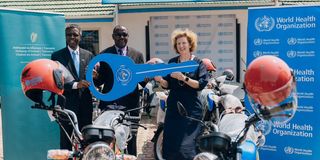Irish Embassy donates motorcycles to step up disease surveillance in remote Tanzania

The disease surveillance and public health emergencies management coordinator at the President’s Office, Regional Administration, and Local Government (PORALG), Mr Gerald Manasseh (centre), receives a key from the deputy head of mission and development cooperation at the Irish Embassy to Tanzania, Ms Mags Gaynor (left), witnessed by the WHO Country Representative, Dr Charles Sagoe-Moses (right). The event took place in Dodoma on Friday, August 16, 2020. PHOTO | COURTERSY
What you need to know:
- The IDSR operates on three tiers, with event-based surveillance at its core involving managing alerts by detecting, notifying, triaging, verifying, and confirming whether an event is genuine or should be dismissed.
Dodoma. Twelve council focal persons in the Integrated Disease Surveillance and Response System (IDSR) have received motorcycles to increase community protection in impassable areas by vehicles.
The IDSR operates on three tiers, with event-based surveillance at its core involving managing alerts by detecting, notifying, triaging, verifying, and confirming whether an event is genuine or should be dismissed.
The disease surveillance and public health emergencies management coordinator in the President’s Office (Regional Administration, and Local Government), Mr Gerald Manasseh, said during the motorcycle handover on Friday, August 16, 2024, that the twelve motorcycles had been donated by the Irish Embassy to Tanzania.
“These motorcycles are crucial for improving people’s protection against health threats,” he said. Mr Manasseh, who represented the PO-RALG deputy permanent secretary responsible for health, said the donation would enhance the country’s disease surveillance programme, allowing verification and response to potential public health concerns.
He underscored the World Health Organisation (WHO)’s contribution to the acquisition of motorcycles, noting that they were important to addressing epidemics such as COVID-19, cholera, and the Marburg virus outbreak.
Further, he named the beneficiary councils with their respective regions into brackets as Mpwapwa and Chemba (Dodoma); Ilemela (Mwanza); Nkasi and Sumbawanga (Rukwa); Ilala (Dar es Salaam); Rorya and Butiama (Mara); and Tanga.
The mission and development cooperation deputy head at the Irish Embassy to Tanzania, Ms Mags Gaynor, commended the government for its commitment to disease surveillance and building a sustainable health system.
“There are many shocks due to climate change. We must remain committed to surveillance to be adequately prepared,” she insisted, underscoring the importance of early information, especially from the community level.
"We truly appreciate the transparency, public communication, and a thorough analysis during last year's Marburg outbreak. It allowed the Ministry of Health and everyone involved to be well-prepared for surveillance," she added.
The WHO country representative, Dr Charels Sagoe-Moser, said strengthening surveillance systems was crucial for effective health management, saying Tanzania had expressed commitment and prioritised surveillance.
“I commend the Ministry of Health for implementing this intervention by reaching out to everyone in the community with healthcare solutions. I thank the Irish Embassy for the donation,” he said.
He said disease surveillance is crucial. “For example, when I was young in a remote area of Ghana, we had a disease surveillance officer who used a motorbike to collect information.”
“I realised that it could not be easily reached by car. Instead, a motorcycle could be used to reach people who lived in scattered settings. It is essential to reach them with healthcare services,” he added.



